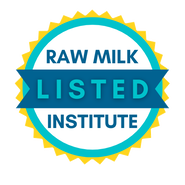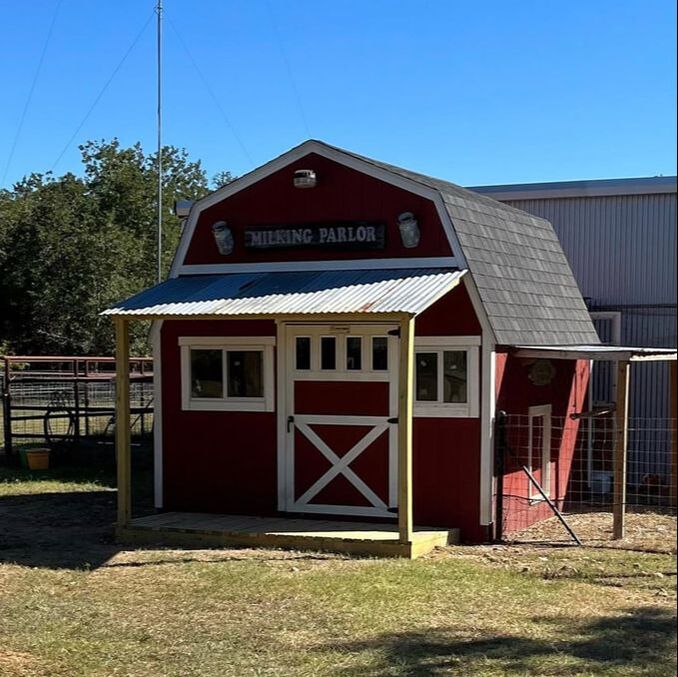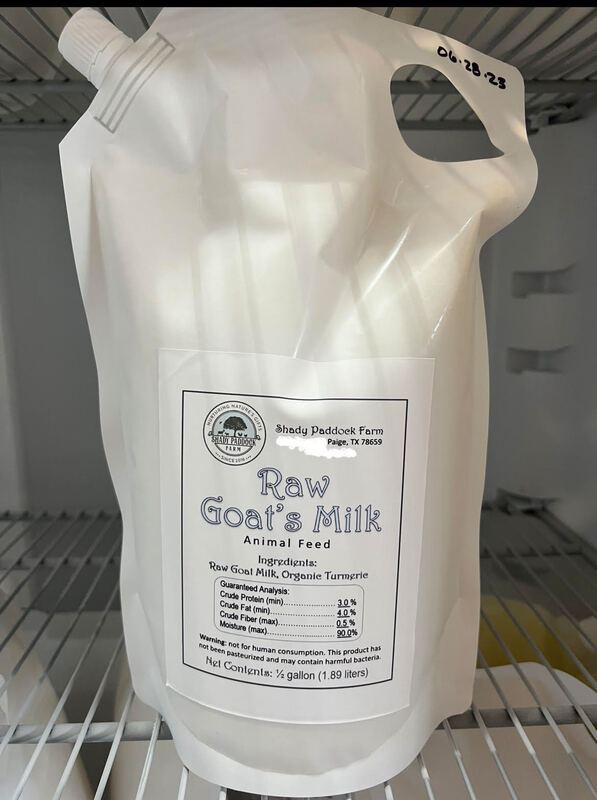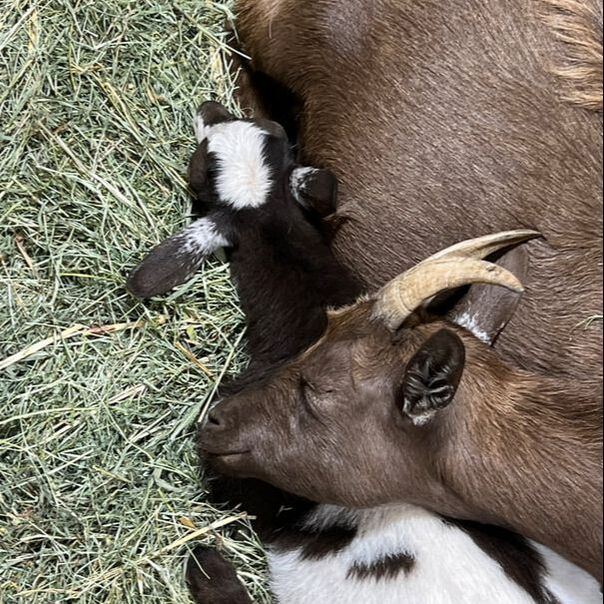Raw Goat Milk Herd Shares & Pet Milk
We have a small herd of Nigerian Dwarf Dairy Goats that produce delicious and nutritious milk.
In 2023, we became the very first Raw Milk Institute (RAWMI) Listed dairy in the State of Texas.
We are able to share our milk with the community through herd shares only, and we invite you to become a herd share member.
If you'd like more info on becoming a member of our herd share program, please fill out the contact form below
and we will be in touch with information & availability for 2024 herd shares.
If you are ready to move forward, just click the box below =)
In 2023, we became the very first Raw Milk Institute (RAWMI) Listed dairy in the State of Texas.
We are able to share our milk with the community through herd shares only, and we invite you to become a herd share member.
If you'd like more info on becoming a member of our herd share program, please fill out the contact form below
and we will be in touch with information & availability for 2024 herd shares.
If you are ready to move forward, just click the box below =)

What is RAWMI?
The Raw Milk Institute (RAWMI) is a non-profit international organization dedicated to promoting and supporting the safe and hygienic production of raw milk and raw milk products for direct human consumption. RAWMI teaches well-established scientific principles and good manufacturing methods to assist farmers to produce hygienic safe raw milk.
Listed RAWMI farmers have in-depth knowledge of potential risks with their own production system, good knowledge regarding the beneficial effects of raw milk, and have demonstrated that raw milk can be very safe. Listed farmers comply with RAWMI common standards, and these include at least monthly milk testing to evaluate basic milk hygiene parameters.
The Raw Milk Institute (RAWMI) is a non-profit international organization dedicated to promoting and supporting the safe and hygienic production of raw milk and raw milk products for direct human consumption. RAWMI teaches well-established scientific principles and good manufacturing methods to assist farmers to produce hygienic safe raw milk.
Listed RAWMI farmers have in-depth knowledge of potential risks with their own production system, good knowledge regarding the beneficial effects of raw milk, and have demonstrated that raw milk can be very safe. Listed farmers comply with RAWMI common standards, and these include at least monthly milk testing to evaluate basic milk hygiene parameters.
Herd Shares
What is a Herd Share?
In a herd share, you purchase an interest in the herd, similar to purchasing stock in a company. You then pay Shady Paddock Farm a monthly boarding fee for care and feeding of your percentage of the herd. In return, you receive a percentage of raw milk produced by your share of the herd. Our structure is 1 share = 1/2 gallon of milk weekly. This may vary depending on how much milk the girls are producing, but we have our structure set up to accommodate drops in production with least impact to herd share members.
How much does a Herd Share cost?
Your initial Bill of Sale is $50 per share. Monthly boarding fee is $35/month. You may sell your share(s) back to the farm at any time with 30 days notice, for the full price ($50 per share) minus a $10 processing fee per share.
At this time, we are not milking year round and have about 2-3 months during the fall/winter where no milk is produced. This gives our does an opportunity to focus on growing seasonal kids and then feeding them exclusively for their first few weeks of life. As our herd grows, we will adjust our kidding cycle to shorten this "dry" time.
For more information and a copy of the herd share contract, email or message us below. Potential and current herd share members are always welcome to visit the farm by appointment.
In a herd share, you purchase an interest in the herd, similar to purchasing stock in a company. You then pay Shady Paddock Farm a monthly boarding fee for care and feeding of your percentage of the herd. In return, you receive a percentage of raw milk produced by your share of the herd. Our structure is 1 share = 1/2 gallon of milk weekly. This may vary depending on how much milk the girls are producing, but we have our structure set up to accommodate drops in production with least impact to herd share members.
How much does a Herd Share cost?
Your initial Bill of Sale is $50 per share. Monthly boarding fee is $35/month. You may sell your share(s) back to the farm at any time with 30 days notice, for the full price ($50 per share) minus a $10 processing fee per share.
At this time, we are not milking year round and have about 2-3 months during the fall/winter where no milk is produced. This gives our does an opportunity to focus on growing seasonal kids and then feeding them exclusively for their first few weeks of life. As our herd grows, we will adjust our kidding cycle to shorten this "dry" time.
For more information and a copy of the herd share contract, email or message us below. Potential and current herd share members are always welcome to visit the farm by appointment.
Raw Goat Milk for Pets & Livestock
|
In 2019 we applied for licensure to sell our surplus milk as Pet Food here in the State of Texas.
Raw goat milk is an excellent addition to your dog or cat's raw diet, and is the perfect food for bottle fed baby goats. Our Pet Milk is sold in frozen 1/4 gallon containers at $4.50 each & 1/2 gallon containers at $8.50 each with discounts available for bulk purchases when inventory allows. No shipping. FARM PICK UP only. After I receive your order, I will reach out to you for a pick-up day/time that worms for both of us. |
Shady Paddock Farm Philosophies & Herd Management
|
We strive to ensure that all animals here on the farm are living their best life. They provide food for us, and in return, we care for them to the best of our ability. This includes regular veterinary care, annual testing for diseases, nutrition monitoring and management, and ongowing wellness assesments with daily personal interactions. Our goats are allowed as much time as possible out on pasture grazing, browsing, and enjoying the warmth of the sun. Everyone is housed in the barn overnight for safety. Does are also kept together with their kids until natural weaning age of 10-12 weeks. Although it is quite common for dairy kids to be removed from their mothers at or soon after birth, this is not something that we are comfortable doing. Leaving kids with their mothers reduces the amount of milk that we get by about 50%, but we believe this compassionate practice provides our herd unmeasurable benefits! |
|
Raw Milk & Herd Share FAQs
Can I purchase milk from you without a Herd Share?
No- In the state of Texas it is illegal to sell raw milk for human consumption unless you are a licensed Grade A Dairy, and even then there are certain rules around those sales. Herd share owners are not purchasing milk; they are paying a boarding fee for the care and boarding of their herd interest and are receiving milk produced by that herd share.
Do you have any protocols in place for the collection and handling of milk?
Yes- we have a milking parlor that is climate controlled and closed off from outside elements. All milk is collected in the parlor by either hand expression or our Simple Pulse milking machine. Hands are washed before we start milking, teats and udders are cleansed thoroughly with warm soapy water and then we use a teat disinfectant before we start milking. Milk is packaged and immediately chilled before being placed into our near freezing milk refrigerator. Our milking machine is cleansed daily with a major breakdown and deep cleaning every week.
In addition to milk handling safety, we also do routine milk testing for hidden signs of mastitis, and we have an On Farm Lab for milk bacteria screening.
Do you do any sort of testing on your herd?
ABSOLUTELY! This should be a question asked by anyone feeding raw milk from any goat to themselves, their pets, or their livestock. We test for CAE, CL, Johne's, Brucellosis, and Q Fever.
In addition, we have a closed herd, with the exception of a new buck coming in every few years from a herd that has been annually tested for CAE, CL, and Johne's at minimum. Does from outside farms would come in on a rare basis. Our goats do not leave our farm to minimize any and all exposures, unless absolutely unavoidable. We have a fabulous food animal veterinarian to monitor and care for our herd as needed, and she is very respectful of our biosecurity practices.
No- In the state of Texas it is illegal to sell raw milk for human consumption unless you are a licensed Grade A Dairy, and even then there are certain rules around those sales. Herd share owners are not purchasing milk; they are paying a boarding fee for the care and boarding of their herd interest and are receiving milk produced by that herd share.
Do you have any protocols in place for the collection and handling of milk?
Yes- we have a milking parlor that is climate controlled and closed off from outside elements. All milk is collected in the parlor by either hand expression or our Simple Pulse milking machine. Hands are washed before we start milking, teats and udders are cleansed thoroughly with warm soapy water and then we use a teat disinfectant before we start milking. Milk is packaged and immediately chilled before being placed into our near freezing milk refrigerator. Our milking machine is cleansed daily with a major breakdown and deep cleaning every week.
In addition to milk handling safety, we also do routine milk testing for hidden signs of mastitis, and we have an On Farm Lab for milk bacteria screening.
Do you do any sort of testing on your herd?
ABSOLUTELY! This should be a question asked by anyone feeding raw milk from any goat to themselves, their pets, or their livestock. We test for CAE, CL, Johne's, Brucellosis, and Q Fever.
In addition, we have a closed herd, with the exception of a new buck coming in every few years from a herd that has been annually tested for CAE, CL, and Johne's at minimum. Does from outside farms would come in on a rare basis. Our goats do not leave our farm to minimize any and all exposures, unless absolutely unavoidable. We have a fabulous food animal veterinarian to monitor and care for our herd as needed, and she is very respectful of our biosecurity practices.
Raw Milk for Pets FAQs
Since you label and sell raw milk as pet food, does that mean that it is handled differently or has something extra added to it that might be bad for my pets/livestock?
The milk that we collect and package for sale is collected and handled EXACTLY the same as the milk that we drink. The only difference is that it must be discolored in some way, as per the guidelines of our licensing agreement. Some people use food coloring, but in our opinion, adding an artificial colorant to a natural product really defeats the purpose of feeding it to your animals. We have been approved to use turmeric to color our milk and haven't had any complaints from our 4-legged friends!
Can you leave the turmeric out of the milk I am purchasing, or color it with something else, like some cranberry juice?
The rules around the sell of raw milk for pet food state that it must be decharacterized - a process using approved dyes which make a substance clearly distinguishable from the same substance for human consumption. Unfortunately, I can not change what I am using to decharacterize the milk because my label is approved for 'turmeric' and not any other ingredient.
Can I drink this milk, even though it is labeled for pets only?
Per the guidelines of the State of Texas, and my licensing agreement, I can only sell you raw milk for pet consumption. It is clearly labeled as such, and also has this state required warning on the label- WARNING: NOT FOR HUMAN CONSUMPTION. THIS PRODUCT HAS NOT BEEN PASTEURIZED AND MAY CONTAIN HARMFUL BACTERIA.
Can I bring my own containers to save a little on the cost of the milk?
The cost of required packaging unfortunately has a significant impact on what I must charge per half gallon. Although I would love to help reduce costs to both you and myself by offering this, the milk must leave my property with all appropriate labeling and warnings on it. It must also be packaged in a container that does not resemble commercial milk containers for human consumption.
The milk that we collect and package for sale is collected and handled EXACTLY the same as the milk that we drink. The only difference is that it must be discolored in some way, as per the guidelines of our licensing agreement. Some people use food coloring, but in our opinion, adding an artificial colorant to a natural product really defeats the purpose of feeding it to your animals. We have been approved to use turmeric to color our milk and haven't had any complaints from our 4-legged friends!
Can you leave the turmeric out of the milk I am purchasing, or color it with something else, like some cranberry juice?
The rules around the sell of raw milk for pet food state that it must be decharacterized - a process using approved dyes which make a substance clearly distinguishable from the same substance for human consumption. Unfortunately, I can not change what I am using to decharacterize the milk because my label is approved for 'turmeric' and not any other ingredient.
Can I drink this milk, even though it is labeled for pets only?
Per the guidelines of the State of Texas, and my licensing agreement, I can only sell you raw milk for pet consumption. It is clearly labeled as such, and also has this state required warning on the label- WARNING: NOT FOR HUMAN CONSUMPTION. THIS PRODUCT HAS NOT BEEN PASTEURIZED AND MAY CONTAIN HARMFUL BACTERIA.
Can I bring my own containers to save a little on the cost of the milk?
The cost of required packaging unfortunately has a significant impact on what I must charge per half gallon. Although I would love to help reduce costs to both you and myself by offering this, the milk must leave my property with all appropriate labeling and warnings on it. It must also be packaged in a container that does not resemble commercial milk containers for human consumption.



